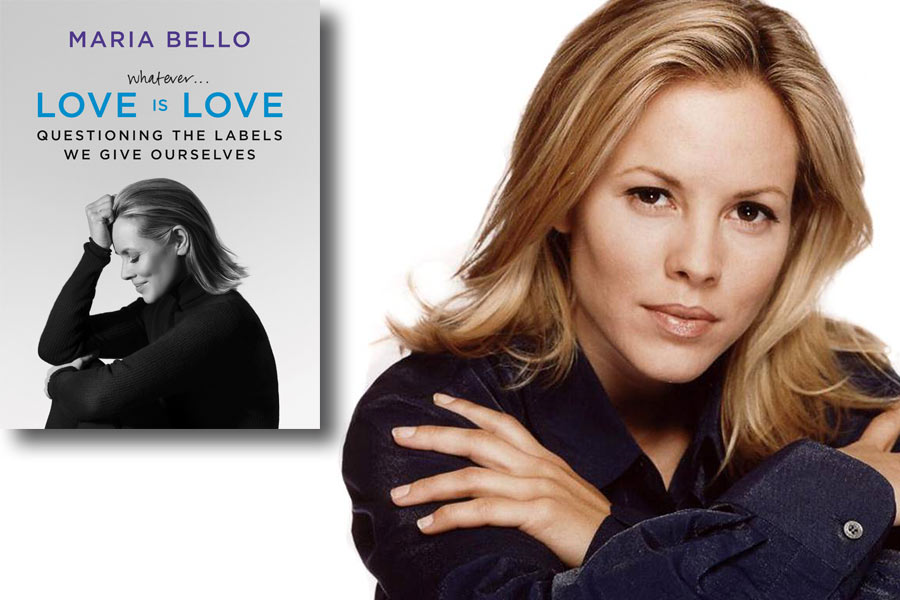Norristown native Maria Bello may be known for her roles in films such as “A History of Violence” and “The Cooler,” but she garnered considerable attention for her essay, “Coming Out as a Modern Family,” when it appeared in the “Modern Love” column in the New York Times. In the essay, Bello explained how she told her son Jack about her relationship with Clare, her best friend. His response: “Whatever, Mom, love is love.”
Bello uses this phrase as the title of her new book, a collection of essays that question labels and identity. In a recent phone interview, Bello spoke about her life, work and family.
PGN: How did the success of your magazine story about being “whatever” change your life and visibility?
MB: After the New York Times article, I had so many people saying, “I’m a whatever” or “I have a whatever family.” It was a duty or responsibility; I think people want to talk about labels to see if they empower us or disempower us. I am proud to be a part of the LGBTW community that fights to love whoever you love and marry who you want to marry. “Whatever” identifies as anything. There is a lack of restriction. I see that with a lot of traditional labels, which don’t fit a lot of people anymore, especially in terms of family and partnership.
PGN: You write rather painfully, and quite candidly, about the struggles you have experienced over the course of your life. What coping skills have you found to be effective? Laughter seems to be the one you most advocate.
MB: There are not many people who go throughout life without having trouble. I can’t answer questions, but I question for myself, and it’s what to do with that pain. I turn my pain into compassion, and to do that, I had to learn to accept what happened, that I am in the right place, doing the right thing. Take that pain and turn it into compassion. For myself, and my family, it was about acknowledging where my father’s pain came from and understanding mental illness, and addiction, and learning to forgive others and forgive ourselves.
PGN: What can you say about the characters you play? Your role in “Downloading Nancy” affected me deeply. Are the characters you play an extension of your life?
MB: “Downloading Nancy” was one of my favorite films. I do believe all the parts I play are some other person. There are hundreds of crevices of pain and joy from my past. I draw on the pieces that character possesses. For Nancy, I’m sure I drew from my suicidal experiences and from my bipolar disorder. I didn’t create her, I was her at some point.
PGN: You mention shame often in the book. How do you feel you have been able to transform your shame into pride?
MB: Let’s go back to the old adage that the truth will set you free. Everyone is not going to like you. Including, perhaps, your own mother and father. But if you get to your true essence, you can change the people around us, and change policy. The opposite of shame is pride, and by owning the labels that empower us and getting rid of the labels that disempower us, we create pride. The only thing I can say to folks is “to be your own self.” Everything positive comes from that. The basis is love. Whatever … love is love. I wanted to belong to a club based in love.
PGN: You look for signs throughout the book. Why do you place such emphasis on fate, or is it faith?
MB: That’s not something I learned from growing up Catholic. I learned it from my mother, who taught us about signs. Angels were looking out for us. If you look for signs, they will be there. Turn superstition into “super.” I talk about being “enough” in the book. I realize my only soul mate and partner is myself — and God, whoever you call God, even if you don’t believe in God. The universe is so much bigger than we are.
PGN: I like your reflections on growing up in Philadelphia and working at the Jersey shore. What can you say about your connection to the city?
MB: When people ask me where I’m from, I never say I’m Italian or Polish, I say I’m from Philly. We have such a particular culture, the love of our Eagles, and food. It’s a culture and heritage I relate to. My son is from Los Angeles but he’s from Philly, too. At the Jersey shore [my family] had a pizzeria; I fell in love for the first time there. In Sea Isle, there was Johnson’s Popcorn. When I go back, we have to make a trip to the Ocean City boardwalk. New Jersey fudge is the best! My family sends it out to me. You cannot get a great cheesesteak in L.A. You can’t get a proper hoagie here!
Maria Bello will read from “Whatever … Love Is Love” 7 p.m. May 1 at Driscoll Auditorium at Villanova University, 1 p.m. May 2 at the Barnes & Noble in Devon and 1 p.m. May 3 at PAT@Giovanni’s Room in Philadelphia.

